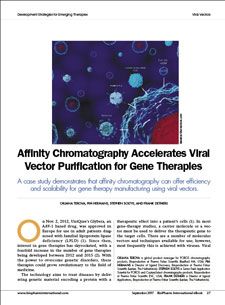
- BioPharm International-09-15-2017
- Volume 2017 eBook
- Issue 2
Affinity Chromatography Accelerates Viral Vector Purification for Gene Therapies
A case study demonstrates that affinity chromatography can offer efficiency and scalability for gene therapy manufacturing using viral vectors.
On Nov. 2, 2012, UniQure’s Glybera, an AAV-1 based drug, was approved in Europe for use in adult patients diagnosed with familial lipoprotein lipase deficiency (LPLD). Since then, interest in gene therapies has skyrocketed, with a fourfold increase in the number of gene therapies being developed between 2012 and 2015. With the power to overcome genetic disorders, these therapies could prove revolutionary to the field of medicine.
The technology aims to treat diseases by delivering genetic material encoding a protein with a therapeutic effect into a patient’s cells. In most gene-therapy studies, a carrier molecule or a vector must be used to deliver the therapeutic gene to the target cells. There are a number of molecular vectors and techniques available for use; however, most frequently this is achieved with viruses.
Download the
.
Article Details
BioPharm International
eBook: Development Strategies for Emerging Therapies
Vol. 30
September 2017
Pages: 27–30
Citation
When referring to this article, please cite it as O. Terova et al., "Affinity Chromatography Accelerates Viral
Vector Purification for Gene Therapies," BioPharm International Development Strategies for Emerging Therapies eBook (September 2017).
Articles in this issue
over 8 years ago
Patenting Prospects for Cell-Based Therapiesover 8 years ago
Harvest of Human Mesenchymal Stem Cells from Microcarriersover 8 years ago
End-to-End Cell Therapy Automation: An Immunotherapy Case Studyover 8 years ago
Optimizing a Unique Cancer Vaccine for Intradermal Deliveryover 8 years ago
Accelerating Genetic Medicine R&D Using Microfluidicsover 8 years ago
Overcoming Hurdles in Emerging Therapy DevelopmentNewsletter
Stay at the forefront of biopharmaceutical innovation—subscribe to BioPharm International for expert insights on drug development, manufacturing, compliance, and more.





